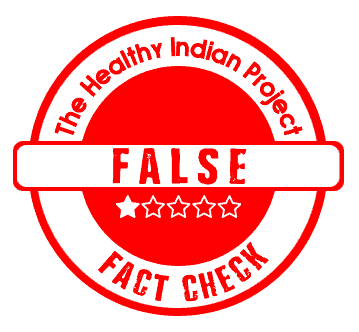Last Updated on January 11, 2024 by Neelam Singh
Quick Take
In an Instagram video, the speaker claims that water intake vary based on individual’s blood group. The video’s creator suggests viewers to adjust their water consumption as written below:
- O+ and O-: 1.5 litres
- A+ and A-: 2 litres
- B+ and B-: 2.5 litres
- AB+ and AB-: 2.75 ml
We fact-checked and found the claim to be false.

The Claim
In an Instagram video, a woman discusses recommended water intake based on blood groups. She explains how different blood types may have varying hydration need. The video’s creator suggests viewers to adjust their water consumption as written below:
- O+ and O-: 1.5 litres
- A+ and A-: 2 litres
- B+ and B-: 2.5 litres
- AB+ and AB-: 2.75 ml
The screenshot below shows how the post looks on Instagram.

Fact Check
Does water intake vary based on individual’s blood group?
No. Proper hydration is vital for overall well-being, supporting essential bodily functions. Whether from alkaline or coconut water, staying hydrated is crucial for a healthy lifestyle. However, the notion that water intake should be based on blood groups is misinformation. Hydration needs are individual, depending on health factors. It is essential to rely on accurate information for informed choices in maintaining well-being.
Typically how much water is recommended to drink?
The amount of water a person should drink can vary based on factors such as age, weight, physical activity, climate, and overall health. However, a common recommendation is to drink at least eight 8-ounce glasses of water a day, which is roughly about 2 liters or half a gallon. This is known as the 8×8 rule.
Some health authorities suggest a more personalised approach, encouraging individuals to listen to their body’s signals for thirst and to adjust water intake accordingly. In certain situations, such as hot weather or intense physical activity, you may need to drink more to stay adequately hydrated.
Are there specific water consumption guidelines tailored to each blood type?
No. There is no widely accepted scientific evidence or consensus supporting the idea that water consumption should be tailored to each blood type. Blood type diets, including any specific guidelines for water intake based on blood type, are generally considered pseudoscientific and lack empirical support.
The recommended daily water intake varies for individuals. Generally, a common guideline is to aim for about 8 glasses of water per day, but individual needs may differ. Besides this, there is also no specific good time to drink water. One should drink enough to satiate the thirst.
So, with this information it is crucial to rely on evidence-based information and consult with healthcare professionals for personalised advice regarding water intake and dietary recommendations.
Dr Shalin Nagori, Consultant Pathologist and Industrial Physician informs, “There is no scientific support for tailoring water consumption to blood type. The Blood Type Diet, proposing such adjustments, lacks credible evidence and has been widely criticised”. Dr Nagori further informs that “Hydration recommendations focus on factors like age, weight, activity level, and climate. The key is to listen to your body’s signals for thirst and consult healthcare professionals for personalized advice based on reliable, evidence-based information”.
How does misinformation on health negatively impact individuals?
Misinformation in the medical domain has the potential to sway treatment decisions. Patients might decline recommended treatments influenced by a handful of negative reports. Conversely, they may insist on a specific treatment, even against medical advice, based on anecdotes of acquaintances experiencing positive outcomes. Such instances underscore the impact of unreliable information on patient choices, highlighting the importance of accurate and evidence-based medical communication.

When asked in an interview Dr Sreenivas Meenakshisundaram, Consultant Neurologist at MGM Healthcare, Chennai said, “Misinformation in the medical world can impact treatment choices, with patients potentially refusing suggested treatments due to a few unfavourable accounts or advocating for a specific treatment, even against professional advice, relying on anecdotes of others who reported positive outcomes with the same treatment. These scenarios highlight the significant role misinformation plays in shaping patient decisions, underscoring the importance of accurate and evidence-based communication in healthcare”.
Disclaimer: Medical Science is an ever evolving field. We strive to keep this page updated. In case you notice any discrepancy in the content, please inform us at [email protected]. You can futher read our Correction Policy here. Never disregard professional medical advice or delay seeking medical treatment because of something you have read on or accessed through this website or it's social media channels. Read our Full Disclaimer Here for further information.

